- Bernard Preston homepage
- Greens
- Lutein Macular Degeneration
Lutein macular degeneration
Lutein macular degeneration tells how an awful eye disease is largely preventable. Many and perhaps most noncommunicable conditions today are the result of either the vital phytochemicals, vitamins and minerals being refined out of good food or the preservatives and other toxic substances added.
Some eleven million Americans suffer from age-onset macular degeneration. It's in many ways a disease of capillaries so those with chronically raised blood glucose are always affected too; advanced glycation products set up inflammatory changes in the retina.
This is one of the most important pages at this site; none of us wants to go blind when we get old. It's a very long read and far too much material to take in at one sitting. My advice if you are concerned about your eyesight, and surely all of us should be is first take a quick scan; and then come back regularly as you adjust your meals.
First up is to eat kale or spinach daily; and a free-range egg.
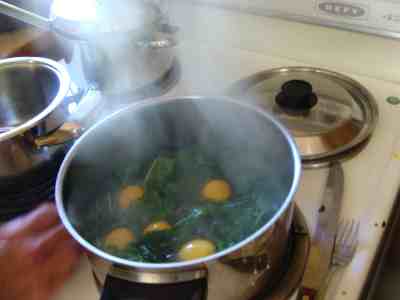
Amsler grid
The Amsler grid is used for a home-test. Do it now.
- Bring each eye in turn whilst cupping the other, wearing your usual spectacles to about 38cm, or fifteen inches, from this screen in ordinary-daylight.
- Focus now on the dot in the centre.
- Are any of the lines wavy, distorted or blurred?
- Do all the little-boxes appear the same size, and normally square?
- Are there any patches in the grid which are dark or missing?
- Keeping your eye focused on the central-dot, can you see the corners and sides of the large grid?
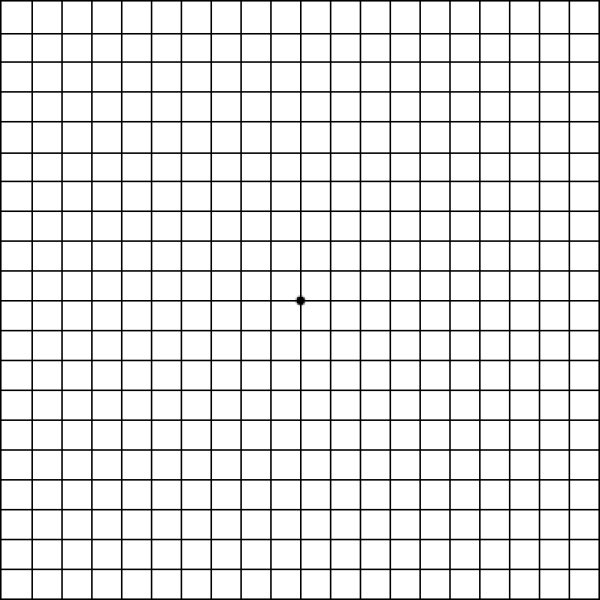
This page was last updated by Bernard Preston on 9th March, 2024.
Macular degeneration of the retina is largely preventable by the presence of certain anti-oxidants in the
eye; and also cataract
formation.
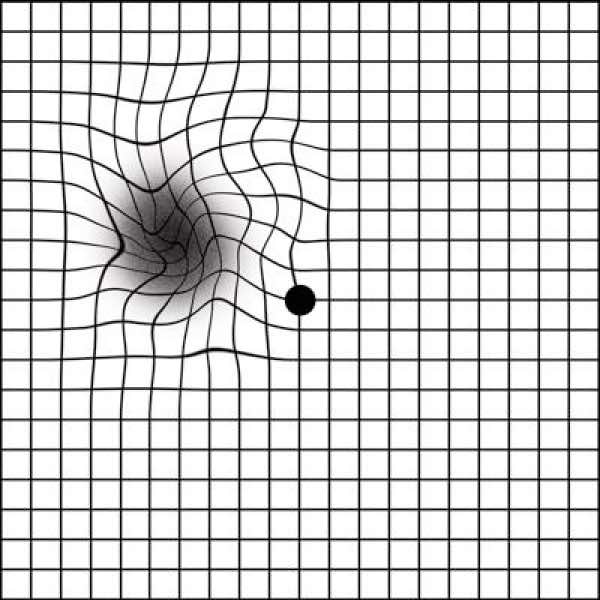
Should there be any distortions such as in the graphic above then it is important to see an ophthalmologist immediately; that means today. Any bleeding behind the retina may cause permanent-blindness.
Much research has been done with beta-carotene, lutein and zeaxanthin; also vitamin E, omega 3 and zinc. We will talk more about that later.
We start this page on lutein macular degeneration with a little tour of the anatomy of the eye; if you are really not interested, then just scroll down.
Photo-receptors in the eye called cones are sensitive to colour; they are packed in the central-spot known as the macula.
These cone receptors come in three colours; red, green and blue.
The cones have various proteins, or pigmentation, which respond to
stimulation by differing wavelengths. They are made light-sensitive by
vitamin A; a deficiency causes half a million children every year to go
blind.
The cones enable us to see fine detail as in reading; and colour so one can visualise different parts of the spectrum. They capture the photons from light rays, converting them to chemical energy which is then detected by a nerve-ending; an impulse is sent to the brain via the optic n.
"Advanced glycation products from raised blood glucose set up inflammatory changes in the retina."
Lutein absorbes the high-energy damaging blue light giving protection to the eye.
There are two types of macular degeneration. One which is inherited and the other is age-related, or acquired. This page relates only to the latter.
Lutein macular degeneration
"11 million persons in the United States are affected; the number is expected to double by 2050.
The prevalence is similar to all invasive cancers combined; and more than double that of Alzheimer's Disease."
- Eye and Vision[9]
Lutein macular degeneration reminds us of the importance of eating nutritious food before disease begins; prevention always was and still is better than a cure. Carotenoids are coloured pigments produced by plants. Enjoyed from fruit and vegetables there is abundant evidence that they reduce malignant tumours, cardiovascular conditions and eye diseases; just to mention a few.
Beta-carotene is the most common of these phytonutrients; when split it forms two molecules of retinal, vitamin A.
But large trials found little benefit from taking supplements; you have to get these carotenoids from the foods where they are found. They are only of value in prevention; once you have the disease, they help little for the sight already lost.
"β-carotene can also act as a lipid radical scavenger and as a singlet oxygen quencher."
- The Journal of Nutrition[8]
These phytonutrients also lower the toxic fats in the plasma that cause the so-called "drusen" deposits in the macula; abnormal lipid and protein salts.
Lutein acts as an antioxidant, mopping up free-radicals and giving protection against what is known as oxidative stress. It is found in high concentrations in the macula where colour and fine detail are detected by the eye.
This carotenoid gives protection against the age-related type of macular degeneration; together with two others called zeaxanthin and oleocanthal.
In a landmark research project reported in JAMA, scientists found that an increase in lutein and its first cousin zeaxanthin, significantly reduced the likelihood of developing three important eye diseases; in total they now affect over eleven million Americans.
"Those enjoying a higher intake of lutein and zeaxanthin from their food have a reduced likelihood of developing age-related macular degeneration."
- Journal of the American Medical Association
In other research French scientists have found that those regularly consuming extra virgin olive oil, which is where the third carotenoid, oleocanthal is found also have less cataracts and blindness from AMD.
SUMMARY
- Lutein from dark-green leafy vegetables.
- Zeaxanthin from yellow corn and various squashes.
- Oleocanthal in extra virgin olive oil.
Glaucoma
"Glaucoma is an eye condition that causes irreversible blindness but shows no obvious symptoms until late-stage disease."
Glaucoma is a leading cause of irreversible blindness. It is in essence a neurodegenerative condition in which oxidative injury by free radical species damages the mitochondria of the retinal ganglion cells.
A comprehensive literature search reveals that those eating foods rich in the carotenoids lutein and zeaxanthin have between 20 and 32% reduction of glaucoma[10].
Debate continues whether the protection is afforded by the carotenoids or the nitrates in dark-green leafy vegetables.
Those with raised blood glucose are especially vulnerable; insulin-resistance is highly inflammatory.
Low-grade inflammation affects stroke severity[11]; it also makes those with eyes vulnerable. A meta-analysis of many studies has confirmed that fasting glucose levels and obesity are associated with intraocular pressure.
Foods rich in lutein are not only beneficial for the prevention of macular degeneration but glaucoma too.
Age-related eye disease study
Researchers reporting on the age-related eye disease study results found that high doses of the following significantly reduce the chances of getting advanced Macular Degeneration.
- Vitamin C
- Vitamin E
- Beta-carotene
- Zinc
However the synthetic beta-carotene caused an increased incidence of lung tumours in smokers; so a second study was done.
- They replaced beta-carotene with synthetic lutein and zeaxanthin.
- Omega-3 oil.
Results showed that the omega-3 made no further improvement; and the lutein and zeaxanthin mixture instead of beta carotene was just as effective.
It's interesting how often these self-same nutrients appear of importance in many other diseases; for example vitamins C and E, plus two others in the prevention of frailty syndrome.
Newsletter
Our newsletter is entitled "create a cyan zone" at your home, preserving both yourself and Mother Earth for future generations; and the family too, of course. We promise not to spam you with daily emails promoting various products. You may get an occasional nudge to buy one of my books.
Here are the back issues.
- Lifestyle and ideal body weight
- What are ultra-processed foods?
- Investing in long-term health
- Diseases from plastic exposure
- Intensive lifestyle management for obesity has limited value
- A world largely devoid of Parkinson's Disease
- The impact of friendly bacteria in the tum on the prevention of cancer
- There's a hole in the bucket
- Everyone is talking about weight loss drugs
- Pull the sweet tooth
- If you suffer from heartburn plant a susu
- Refined maize meal and stunting
- Should agriculture and industry get priority for water and electricity?
- Nature is calling
- Mill your own flour
- Bake your own sourdough bread
- Microplastics from our water
- Alternative types of water storage
- Wear your clothes out
- Comfort foods
- Create a bee-friendly environment
- Go to bed slightly hungry
- Keep bees
- Blue zone folk are religious
- Reduce plastic waste
- Family is important
- What can go in compost?
- Grow broad beans for longevity
- Harvest and store sunshine
- Blue zone exercise
- Harvest and store your rainwater
- Create a cyan zone at your home
More research
A massive study published in JAMA, after following over 100,000 nurses for 26 years found a risk reduction of 40% of developing age-related Macular Degeneration when comparing those with the most lutein and zeaxanthin to those with the least in the blood.
To get lutein benefit you have to persuade your tongue that even if it doesn't really like dark-green leafy vegetables, nevertheless to stop one going blind you will eat them. And then a strange thing happens; you find you actually grow fond of spinach and kale.
Vitamin D
Vitamin D is a complementary factor in lutein macular degeneration. Research published in JAMA Ophthalmology reported a massive 6.7 increased odds of women developing age related Macular Degeneration if they were deficient in vitamin D.
Vitamin D is best obtained from moderate exposure to sunshine, with a hat on; and cold-water fish like salmon, mackerel and mussels.
Read more about food rich in vitamin D.
Vitamin B
Researchers have found in a strong study conducted at Harvard Medical School that a group of professionals at high-risk of cardiovascular disease given vitamins pyridoxine, folate and B12 after 7.3 years had a significantly lower prevalence of AMD[3] too.
Phosphate
High serum phosphate is another cause of macular degeneration. From soft drinks, processed meat and baked goods the compound is directly implicated in calcification of the inner lining of arteries leading to high blood pressure and AMD[4].
Pyrophosphate is a common stabiliser used in many processed foods.
Cataracts
Research published in Current Medical Research and Opinion confirms that supplements with preparations including lutein and zeaxanthin not only significantly decreased the incidence of age-related macular degeneration but also the development of nuclear lens opacities; cataracts.
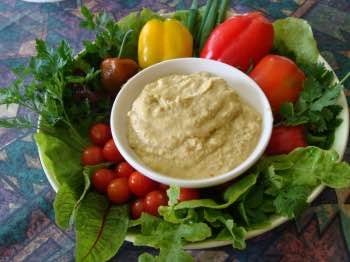 A divine green salad with humus.
A divine green salad with humus.In general your greens are a rich source of lutein and zeaxanthin. Near the top of the list by a mile are raw greens but also when lightly-steamed; read more at benefits of kale.
Spinach, broccoli and lettuce are all good sources of lutein and zeaxanthin; as are eggs and corn on the cob too.
Free-range eggs have 7 times more carotenoids, obviously from the greens the hens themselves enjoy. Just watch a group of chickens go crazy if they get into the kale patch.
In short rather than taking pills let your food be your medicine; that was the advice of the great Hippocrates, the father of all Western health care.
Hippocrates also used and advocated spinal manipulation; not for macular degeneration obviously.
"Greater carotenoid levels in the macular pigment were largely associated with improved visual performance in glaucomatous eyes."
- Nutrients. June, 2021
Myopia
Myopia is the medical name for nearsightedness; you can see objects that are close up clearly but not those at a distance.
Of great concern is how many children are now suffering from myopia. Screen-time, long periods studying indoors and too few hours spent out in bright sunshine are thought to be the causes.
More than half of young children with the disease will develop what is known as "high myopia;" with attendant risk of serious eye conditions like retinal detachment, glaucoma and macular degeneration.
"There is evidence that the onset of myopia can be prevented or delayed with lifestyle recommendations; such as an increase in outdoor time."
- JAMA Ophthalmology
Foods high in lutein, zeaxanthin and oleocanthal
So here's the deal; enjoy foods high in lutein, zeaxanthin and oleocanthal or get cataracts, glaucoma and a high probability of blindness.
Hidden in Bernard Preston's lunch today you will find the benefits of spinach; lutein macular degeneration is a topic close to my heart. I have no desire to go blind in my dotage; or have a cataract operation. I have two friends who went completely blind in one eye after the surgery.
Nothing is without risk including spinal manipulation.
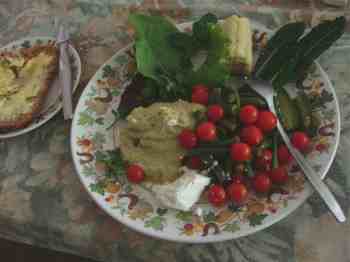
Nutritional value of kale
The recommended allowance is a minimum of 5mg of lutein per day; 1 cup of raw kale and a half when lightly-cooked provide 3 times the daily requirement.
Be generous when pouring olive oil onto your salad; for the oleocanthal.
There are thousands of these vital phytochemicals; it's simply impossible to take them all in supplements. The solution to lutein macular degeneration and the many other diseases caused by a deficiency is to enjoy coloured-foods on a daily basis.
In fact research shows that those enjoying 8 or more coloured foods every day have a massive 35% lower all-cause of death.
The nutritional value of kale is an important page for anyone concerned about their eyes.
Dark green leafy vegetables are not the most interesting-tasting foods; dicky them up with one of these recipes for cooking kale.
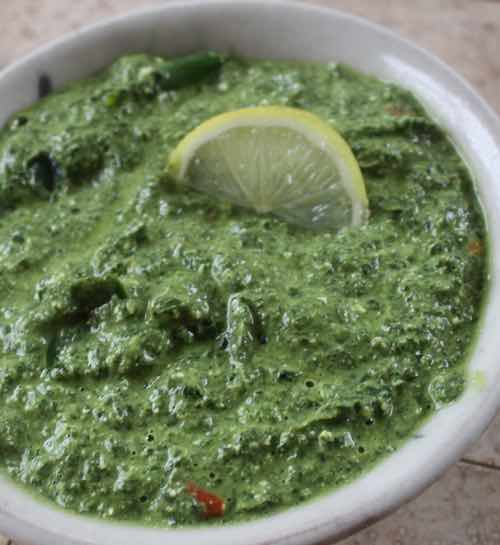
- Spinach and kale sauce is terrific with pasta. Prepare it in just five minutes.
How to grow corn
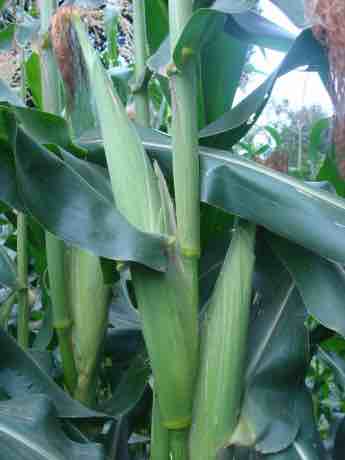
How to grow corn is just one other way to decrease your risk of suffering from lutein-deficiency macular degeneration.
Maize gets bad press these days, mainly because of the devastating effect of high fructose corn-syrup used by irresponsible food manufacturers.
But the very low carb keto diets also frown on corn in any form because of its albeit natural-starch content.
Our strong recommendation is to enjoy all these natural foods on a daily basis. In the context of the whole meal fresh-corn on the cob certainly cannot be described as glycemic; the effect on blood sugar is minimal. It has a low GI. Take a short walk after lunch if you feel vulnerable.
The exercise associated with gardening also helps to normalise blood glucose; and makes sure the retinal vessels get sufficient oxygen, vitamin D and these nutrients.
How to make homemade cornbread is important for all those who grow the grain; the cobs eventually become too hard to eat. But one can still benefit from the carotenes with just a few culinary skills from our green kitchen. As always a pressure-cooker is a most useful appliance, saving time and money.
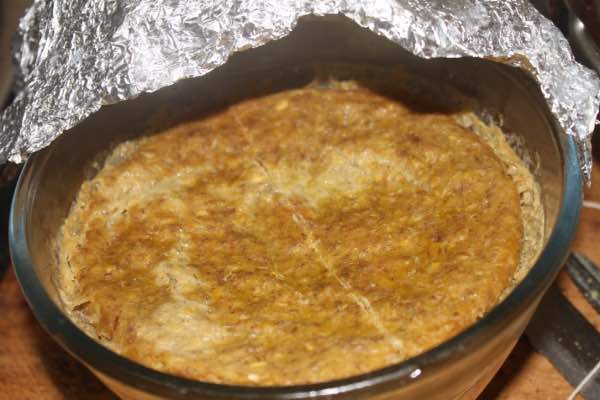
Just 35 minutes in the pressure cooker is all it takes to make this cornbread using only 100% grain; it is super-delicious.
Chew your food thoroughly is a timely reminder; whether it is the extra mastication of whole grains and salads or the greater release of the carotenes, researchers have found it even delays the onset of dementia.
Olive oil
Many studies have pointed out that nutritional factors and dietary patterns influence the onset and progression of macular degeneration.
It is well researched that a Mediterranean diet specifically enriched with extra olive oil will reduce the risk of cardiovascular mortality by nearly 50%[1]. Could it help prevent macular degeneration?
Research done in Australia on nearly 7,000 older folk found that adding one tablespoon of olive oil every day reduced late onset macular degeneration by over 50%. According to Professor Vicki Flood from the University of Sydney this is in part because the fat helps us absorbe more of the lutein and zeaxanthin that are on our plates; it increases the bio-availability.
In this study they found that trans fats, as found in margarine, were associated with an increased prevalence of late-onset AMD, whereas olive oil decreased it.
And omega-3 lowered the prevalence for early-onset macular degeneration[2].
- Cold-water fish
- Purslane plant
There was also the suggestion that one of the polyphenols found only in extra virgin olive oil reduced the oxidative stress in the tissues in the retina.
Rosemary
Rosemary is the herb often used in the cooking of chicken; it contains a phytochemical called carnosic acid. It is one of the anti-oxidants known to mop up free radicals; it is also noted for increasing blood flow and nerve conduction.
Researchers at the Sanford-Burnham Medical research institute found that it also protects the retina from degeneration; perhaps just from the increased blood flow.
Eggs
Researchers reporting in J Nutr declared that eating one egg per day for five weeks increased the serum lutein by 26% and zeaxanthin by 38 percent. Interestingly total cholesterol, LDL and HDL levels were not affected; nor were triglycerides. That is now well known; it's not the animal fats we eat that cause dyslipidemia but the refined carbs.
It is unlikely they used free-range eggs; the benefits would certainly be even greater.
So eggs give zeaxanthin and lutein protection against macular degeneration and do not increase the risk of cardiovascular disease from raised cholesterol; ironically they are now endorsed by the Heart Association.
Macular degeneration and the gut-retinal axis
Researchers have found that a teeming microbiome supported by whole grain foods also produces certain metabolites that protect the eyes from macular degeneration[5].
That is the reason we ferment kefir in our own kitchen and take it several times a week.
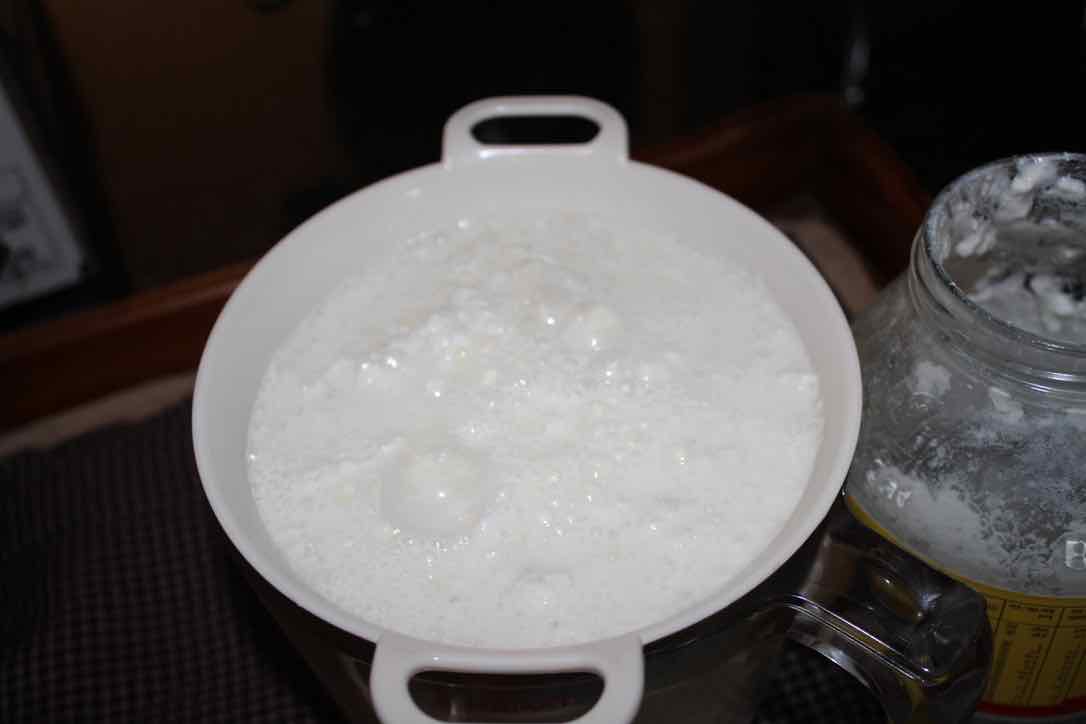 Kefir is so easy to make.
Kefir is so easy to make.Dietary nitrates
"Nitrate intake is associated with a decreased risk of progression to late AMD."
- JAMA Ophthalmology
Dark-green leafy vegetables are the best source of dietary nitrates.
Please note and this is important that nitrites are quite different. They are used as preservatives in cured meats such as ham and bacon; fingered as the cause of serious conditions like Parkinson's Disease.
Enjoy processed meat only on high and holy days.
Parkinson's Disease
A specific dopamine receptor on blood vessels near the retina blocks the formation of new capillaries associated with wet AMD; see the photo below.
Parkinson's Disease is caused by low levels of dopamine; those on drug treatment for the disease were found to develop adult-onset macular degeneration four years later.
It is likely that regular consumption of fava beans, the only source of pharmaceutical amounts of L-dopa would also be protected against AMD.
Eggs Parkinson's Disease contains fava beans and dark-green leafy vegetables cooked in olive oil.
Bernard Preston
Bernard Preston is passionate about attempting as far as possible to enjoy a life without medication. That means plenty of exercise and a return to the foods that our great-grandmothers once served.
The last fifty years during which our mothers were greatly influenced by the move away from natural living to convenience foods, have been characterised by obesity and skyrocketing autoimmune diseases.
Whilst some of the research mentioned above is about the supplements used in the struggle with lutein macular degeneration, our focus is rather about getting this nutrient naturally on a daily basis from our food; long before one has a positive Amsler grid test.
Interestingly two independent researchers, one in America and the other in Europe have found that the prevalence of AMD is actually decreasing. Many reasons are put forward; reduced smoking is top of the list, known to be an important factor in the disease.
- Olive oil intake and risk of cardiovascular disease and mortality in the PREDIMED Study.
- Fat Consumption and Its Association With Age-Related Macular Degeneration
- B vitamins may protect against macular degeneration
- Major cause of blindness linked to calcium phosphate deposits in the eye
- Involvement of a gut–retina axis in protection against food related glycemia-induced age-related macular degeneration
- Macular degeneration visuals at WebMD
- Diabetes Mellitus and Risk of Age-Related Macular Degeneration
- β-Carotene Is an Important Vitamin A Source for Humans
- Epidemiology of age-related macular degeneration
- Carotenoids in the Management of Glaucoma
- Low-grade inflammation affects stroke severity. Web: https://tinyurl.com/ye66vkh7
- Parkinson's Drug May Delay Onset of Wet AMD
When browsing use right click and "Open Link in New Tab" or you may get a bad gateway signal.
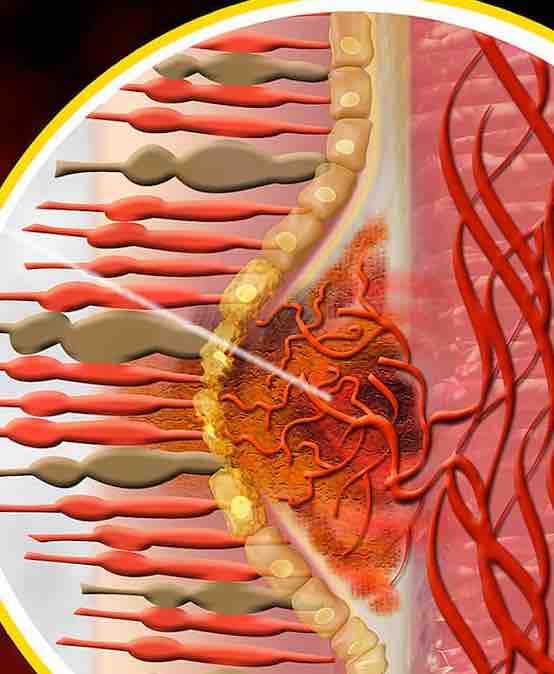
Both diabetes and macular degeneration cause changes in the micro capillaries in the retina. Raised blood glucose also leads to the inflammatory pathways associated with damage to the eye and adult-onset blindness[7].
Obviously this is not intended to be an in-depth article on macular degeneration; we are just stating that simple changes in lifestyle can profoundly reduce the risk of going blind unnecessarily when we get old. Prevention always remains better than a cure.
If you are anxious about dementia then remember that you are twice as likely to suffer from Macular Degeneration. Going blind should scare us just as much as losing our marbles.
From the horse's mouth
Did you find this page interesting? How about forwarding it to a friendly book or food junkie? Better still, a social media tick would help.
- Bernard Preston homepage
- Greens
- Lutein Macular Degeneration
Address:
56 Groenekloof Rd,
Hilton, KZN
South Africa
Website:
https://www.bernard-preston.com